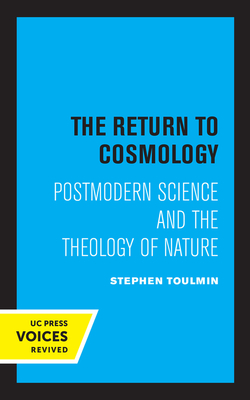The Return to Cosmology: Postmodern Science and the Theology of Nature

The Return to Cosmology: Postmodern Science and the Theology of Nature
"Can we rely on the discoveries that scientists make about one or another part, or aspect, of the world as a basis for drawing conclusions abou the Universe as a Whole?" Thirty years ago, the separateness of different intellectual disciplines was an unquestioned axiom of intellectual procedure. By the mid-nineteen-seventies, however, even within the natural sciences proper, a shift from narrowly disciplinary preoccupations to more interdisciplinary issues had made it possible to reopen questions about he cosmological significance of the scientific world picture and scarcely possible any longer to rule out all religious cosmology and "unscientific." This book, the product of both a professional and personal quest, follow the debate about cosmology--the theory of the universe--as it has changed from 1945 to 1982. The open essay, "Scientific Mythology" reflects the influence of Stephen Toulmin's postwar study with Ludwig Wittgenstein in its skepticism about the naive extrapolation of scientific concepts into nonscientific contexts. Skepticism gradually gives way to qualified optimism that there may be "still a real chance of working outward from the natural sciences into a larger cosmological realm" in a series of essays on the cosmological speculations of individual scientists, including Arthur Koestler, Jacques Monod, Carl Sagan, and others. In the programmatic concluding essays, Toulmin argues that the classic Newtonian distinction between the observer and the observed was inimical not only to the received religious cosmology but also to any attempt to understand humanity and nature as parts of a single cosmos. In the twentieth century, however, what he calls "the death of the spectator" has forced the postmodern scientist--theoretically, in quantum physics, and practically, in the recognized impact of science-derived technologies on the environment--to include himself in his science. This title is part of UC Press's Voices Revived program, which commemorates University of California Press's mission to seek out and cultivate the brightest minds and give them voice, reach, and impact. Drawing on a backlist dating to 1893, Voices Revived makes high-quality, peer-reviewed scholarship accessible once again using print-on-demand technology. This title was originally published in 1982.
PRP: 262.03 Lei
Acesta este Pretul Recomandat de Producator. Pretul de vanzare al produsului este afisat mai jos.
235.83Lei
235.83Lei
262.03 LeiIndisponibil
Descrierea produsului
"Can we rely on the discoveries that scientists make about one or another part, or aspect, of the world as a basis for drawing conclusions abou the Universe as a Whole?" Thirty years ago, the separateness of different intellectual disciplines was an unquestioned axiom of intellectual procedure. By the mid-nineteen-seventies, however, even within the natural sciences proper, a shift from narrowly disciplinary preoccupations to more interdisciplinary issues had made it possible to reopen questions about he cosmological significance of the scientific world picture and scarcely possible any longer to rule out all religious cosmology and "unscientific." This book, the product of both a professional and personal quest, follow the debate about cosmology--the theory of the universe--as it has changed from 1945 to 1982. The open essay, "Scientific Mythology" reflects the influence of Stephen Toulmin's postwar study with Ludwig Wittgenstein in its skepticism about the naive extrapolation of scientific concepts into nonscientific contexts. Skepticism gradually gives way to qualified optimism that there may be "still a real chance of working outward from the natural sciences into a larger cosmological realm" in a series of essays on the cosmological speculations of individual scientists, including Arthur Koestler, Jacques Monod, Carl Sagan, and others. In the programmatic concluding essays, Toulmin argues that the classic Newtonian distinction between the observer and the observed was inimical not only to the received religious cosmology but also to any attempt to understand humanity and nature as parts of a single cosmos. In the twentieth century, however, what he calls "the death of the spectator" has forced the postmodern scientist--theoretically, in quantum physics, and practically, in the recognized impact of science-derived technologies on the environment--to include himself in his science. This title is part of UC Press's Voices Revived program, which commemorates University of California Press's mission to seek out and cultivate the brightest minds and give them voice, reach, and impact. Drawing on a backlist dating to 1893, Voices Revived makes high-quality, peer-reviewed scholarship accessible once again using print-on-demand technology. This title was originally published in 1982.
Detaliile produsului








